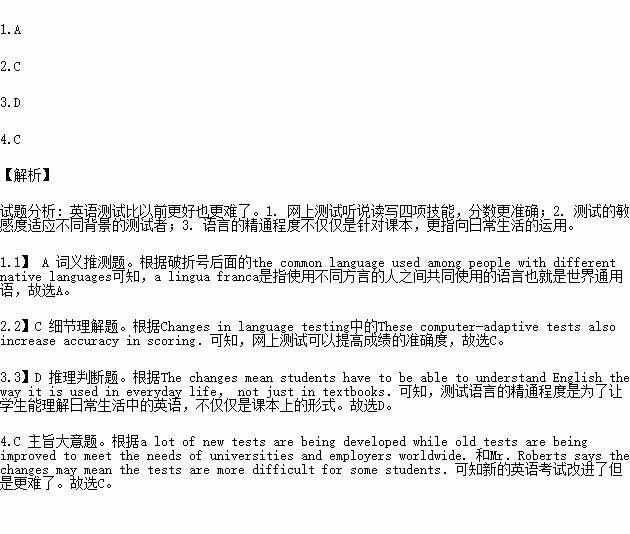题目内容
Clive Roberts,a director at ELS Educational Services,says English tests are changing greatly in response to the global growth in the use of English as a lingua franca— the common language used among people with different native languages.For that reason,a lot of new tests are being developed while old tests are being improved to meet the needs of universities and employers worldwide.
Changes in language testing
“A lot of tests are now delivered online,all four skills are being tested,in some cases,by computer,in particular speaking and writing skills,which are the most difficult to assess on a computer environment,”says Mr.Roberts.
Computer testing will reduce the length of time required for testing,because the tests adjust to the test-taker’s ability.These computer-adaptive tests also increase accuracy in scoring.Computer-adaptive tests change depending on the test-taker’s responses.They can become more or less difficult during the testing session.For this reason,the set of correct answers will be different for each test-taker.
Cultural sensitivity
Another change to language testing relates to cultural sensitivity.The term refers to material on a test that is based on a certain culture or is hard for test-takers from different cultures to understand.
Mr.Roberts says test development companies are now hiring people with intercultural communication backgrounds to review test items.The companies want to make sure the test does not upset test-takers.
Proficiency(精通程度)in language
Changes to English proficiency tests make them better at measuring the learners’ ability.However,Mr.Roberts says the changes may mean the tests are more difficult for some students.
“The tests have become more proficiency-oriented.The items are being designed in such a way that they test real-world proficiency and not simply sort of an artificial environment or a specific set of skills that are taught in a classroom.So a lot of authentic texts,a lot of authentic listening passages are being used.”
The changes mean students have to be able to understand English the way it is used in everyday life, not just in textbooks.
1.Which of the following can best replace the underlined words“a lingua franca”in Paragraph l?
A. a universal language B.a second language
C.a native language D.a mother tongue
2.Which of the following is true about online English tests?
A.Listening is more difficult to be tested online than speaking.
B.Online English tests need more time.
C.Online English tests make scoring more accurate.
D.Online English tests are more difficult.
3.Why is proficiency stressed in language testing?
A.To make the test more difficult.
B.To get learners to learn textbooks well.
C.To test learners’speaking ability.
D.To test learners’ real ability to use the language.
4.Which words can best describe the new English tests?
A. More accurate but easier.
B.Less practical but harder.
C. Better but harder.
D.Less popular but easier.
 名校课堂系列答案
名校课堂系列答案
